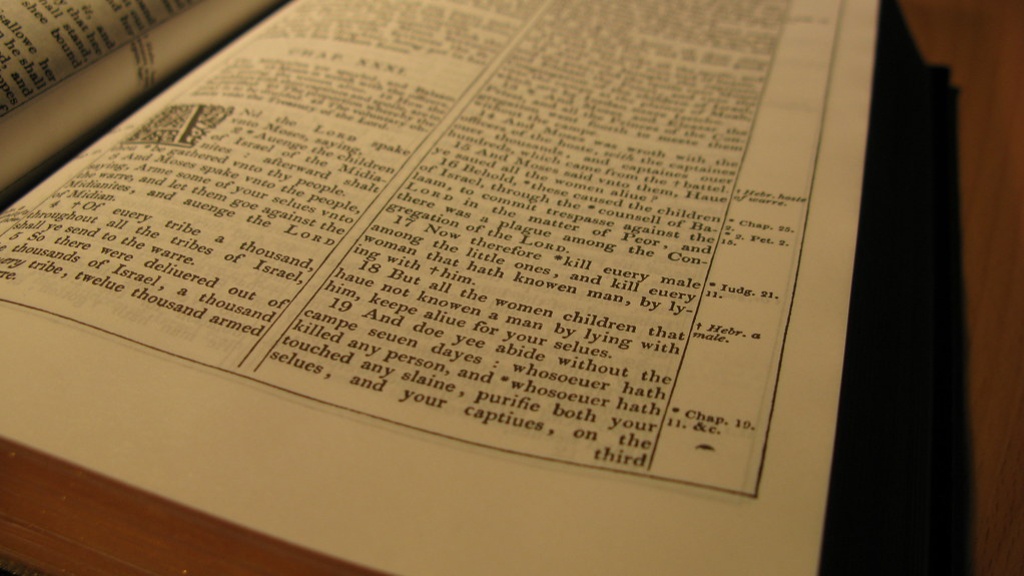Rape is an act of violence, aggression, and domination that no culture or country has been able to fully eradicate. It is deeply rooted in gender inequality and power dynamics in society, and remains an extremely serious problem around the world. So what does the Bible say about rape?
The Bible, arguably one of the most influential books in the world, has no specific references to the word “rape”, but there are plenty of passages that touch on the topic. In the Old Testament, there are specific laws with regards to women who have been taken as spoils of war, for example in Deuteronomy 21:10-14.
In this passage, the Israelites are forbidden from taking captive women from among their enemies as a wife because it would violate the rule of justice. This shows that the notion of rape was clearly known and understood, and the Bible looks at it from a more dehumanizing perspective – the woman was viewed not as an active participant in her own fate, but as a kind of property governed by societal rules and regulations.
The Bible also speaks of cases of rape and incest in a few other passages. In Genesis 19, Lot offers his daughters to strangers who came to stay with him, who, in return, commit sexual assault and rape them.
In 2 Samuel 13, the rape of Tamar by her half-brother Amnon is recounted. This passage is especially of note, since it is one of the few instances in which the victim’s feelings and emotions are addressed, showing that rape is not only an act of violence, but is also a violation of the victim’s dignity and privacy.
While there is no explicit condemnation of rape in the Bible, it does acknowledge the trauma inflicted on the victim and speaks about it in no uncertain terms. This is particularly significant given the fact that the patriarchal society of the time may have silenced the victim from speaking out about their experience.
For Christians, the Bible is the ultimate source of morality and guidance. While it does not directly speak out against rape, it does promote the importance of justice and mercy and condemns those who perpetrate such acts. This can be seen in passages such as Psalms 11:5-6 and Proverbs 6:16-19, which call for justice to be done and for the punishment of oppressors.
Ultimately, the Bible calls for justice and mercy, as well as respect for human life and dignity. The Bible is not only a source of solace and hope, but also a reminder that rape must not be tolerated and perpetrators must be brought to justice. It is a reminder that there is no excuse for violence, and no act of violence is ever justified or approved of.
Gender Discrimination
Despite the Biblical condemnation of rape, gender discrimination and power dynamics continue to be the norm in many societies, which gives perpetrators a free pass to rape. In the Bible, women are often viewed as voiceless and subordinate, and even today, patriarchal power structures in many cultures can be seen as making women a target for sexual violence. Patriarchal societies often view women as objects, a notion which encourages the notion of rape as an act of power and domination.
In these societies, misogynistic attitudes can be seen as contributing to a culture of gender-based violence, where women feel disrespected, powerless, and unable to speak out. This contributes to a feeling of helplessness and powerlessness amongst victims, making it harder for them to come forward.
The Bible, while it does not condone rape, also speaks of marriage and sexual activity in terms which often reflect the gender discrimination of its time. For example, in 1 Corinthians 7:1-2, it is written that “it is better for a man not to touch a woman”, which implies that women should not be touched or treated inappropriately by men. Despite this, gender discrimination and oppression of women still exists today, making it difficult for victims to feel safe and secure.
Protection of Victims
The Bible speaks of mercy and justice and seeks to protect victims of rape, though the specifics of what that entails is not necessarily stated directly. Additionally, some passages, such as Deuteronomy 22:25-27, carry the implication that victims of rape should be treated with mercy, rather than punished. This implies that the Bible recognizes the fact that victims are often powerless and should be protected, rather than being viewed as complicit in the act of rape.
The Bible also states that those who commit rape should be brought to justice. In Deuteronomy 22:25-30, it is written that a man who rapes an unmarried woman must be brought before the elders of his town and must pay the victim’s father for her loss of virginity, regardless of her consent. This shows that the Bible does not condone rape and calls for accountability for those who commit it.
What’s more, the Bible recognizes that rape is often accompanied by irreparable physical and psychological damage and lasting trauma for victims. In other passages, such as Deuteronomy 22:23-24, it states that if a woman does not scream and fight due to fear, she should not be blamed or punished. This shows that the Bible speaks to the victim’s right to safety and protection.
Healing and Forgiveness
The Bible also speaks of the need for healing and forgiveness in the wake of rape. In Matthew 6:14-15, Jesus says “If you forgive other people when they sin against you, your heavenly Father will also forgive you. But if you do not forgive others their sins, your Father will not forgive your sins.”.
This speaks to the need for those who have been raped to not be weighed down by unforgiveness and to find healing and restoration. The Bible speaks of the need for victims to not be weighed down by unforgiveness but to be able to forgive and move on from the trauma of rape.
There are also passages where God speaks of His desire to bring comfort to those in need, such as in Isaiah 49:13, “Sing for joy, O heavens, and exult, O earth; break forth, O mountains, into singing! For the Lord has comforted his people, and will have compassion on his afflicted.” This reminds us of the hope and comfort that God can bring to those who are suffering.
Speak Out Against Rape
Though it is not a direct condemnation of rape, the Bible speaks to the fact that rape is an act of violence and aggression and should not be tolerated. The Bible speaks to the rights of the victim and the need for justice and healing. It reminds us that rape is a serious crime and perpetrators must be brought to justice. It also speaks of God’s love and compassion and His desire to comfort those who are suffering.
The Bible is a source of solace to those who have been raped, but it also serves to remind us of the importance of speaking out against rape and the need for a society which does not condone this act of aggression. It is only when we refuse to tolerate rape, when we speak out and take action, that we can truly make a difference and create a world where rape is not tolerated.
Eliminating Victim-Blaming
Victim blaming is one of the many obstacles in the fight against rape, and yet it is one of the most common responses to rape. Victim blaming, or the idea that the victim is somehow to blame for the rape, serves to excuse rape culture and reinforces the power dynamics at play. This can have serious psychological implications, as it can lead to feelings of guilt and shame, as well as a sense of powerlessness.
The Bible, while not explicitly condemning victim blaming, speaks of justice and mercy, which calls for the protection of victims. In Leviticus 19:15, it is written, “You shall do no injustice in judgment; you shall not be partial to the poor or defer to the great, but in righteousness shall you judge your neighbor.” This discourages the notion of blaming the victim, as it calls for justice and fairness, protecting those who are powerless from the threat of oppression and injustice.
The Bible also speaks of compassion and mercy and warns against victim shaming. In Luke 6:36, Jesus says, “Be merciful, even as your Father is merciful.” This speaks directly to the need to have empathy and understanding towards victims of rape, rather than to view them with judgement and criticism.
Shifting Paradigms
Though the Bible does not explicitly speak out against rape, its emphasis on justice, mercy, protection, and healing is a powerful reminder of the need to stand up against rape and to protect victims. It also speaks to the need for a shift in attitudes and paradigms, from viewing rape as an act of power and domination, to one of respect and understanding.
The Bible does not condone rape, but rather reminds us that this act of violence is never justified. The Bible speaks to the dignity and rights of the victim and calls on individuals and societies to not tolerate rape or excuse its perpetrators.
It also speaks of God’s desire to comfort and restore those who have been victimized. Ultimately, the Bible calls on us to take a stand against rape and to seek justice and mercy for its victims.





